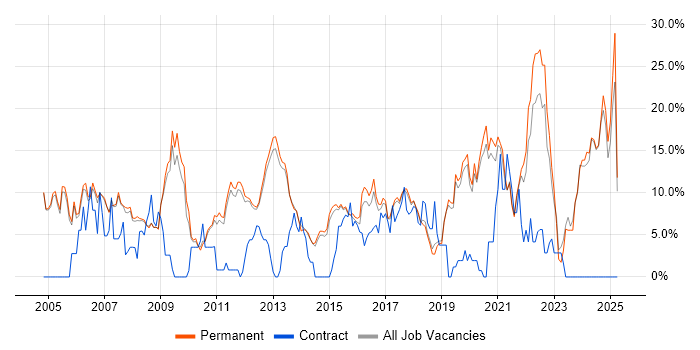Software Engineering
Manchester > Stockport
The table below provides summary statistics and salary benchmarking for jobs advertised in Stockport requiring Software Engineering skills. It covers permanent job vacancies from the 6 months leading up to 17 January 2026, with comparisons to the same periods in the previous two years.
| 6 months to 17 Jan 2026 |
Same period 2025 | Same period 2024 | |
|---|---|---|---|
| Rank | - | 11 | 12 |
| Rank change year-on-year | - | +1 | +8 |
| Permanent jobs citing Software Engineering | 0 | 9 | 10 |
| As % of all permanent jobs in Stockport | - | 9.89% | 11.63% |
| As % of the Processes & Methodologies category | - | 9.89% | 17.54% |
| Number of salaries quoted | 0 | 4 | 2 |
| 10th Percentile | - | £43,625 | - |
| 25th Percentile | - | £45,313 | £51,250 |
| Median annual salary (50th Percentile) | - | £63,750 | £52,500 |
| Median % change year-on-year | - | +21.43% | -16.00% |
| 75th Percentile | - | £82,500 | £53,750 |
| 90th Percentile | - | - | - |
| Manchester median annual salary | £67,500 | £65,000 | £65,000 |
| % change year-on-year | +3.85% | - | +6.56% |
All Process & Methodology Skills
Stockport
Software Engineering falls under the Processes and Methodologies category. For comparison with the information above, the following table provides summary statistics for all permanent job vacancies requiring process or methodology skills in Stockport.
| Permanent vacancies with a requirement for process or methodology skills | 57 | 91 | 57 |
| As % of all permanent jobs advertised in Stockport | 100.00% | 100.00% | 66.28% |
| Number of salaries quoted | 13 | 51 | 46 |
| 10th Percentile | £30,000 | - | £22,875 |
| 25th Percentile | £31,250 | £25,000 | £26,250 |
| Median annual salary (50th Percentile) | £35,000 | £52,500 | £32,500 |
| Median % change year-on-year | -33.33% | +61.54% | -35.31% |
| 75th Percentile | £52,500 | £63,125 | £52,500 |
| 90th Percentile | £63,500 | £77,500 | £57,500 |
| Manchester median annual salary | £55,000 | £55,000 | £55,000 |
| % change year-on-year | - | - | -4.35% |
Software Engineering
Job Vacancy Trend in Stockport
Historical trend showing the proportion of permanent IT job postings citing Software Engineering relative to all permanent IT jobs advertised in Stockport.

Software Engineering
Salary Trend in Stockport
Salary distribution trend for jobs in Stockport citing Software Engineering.

